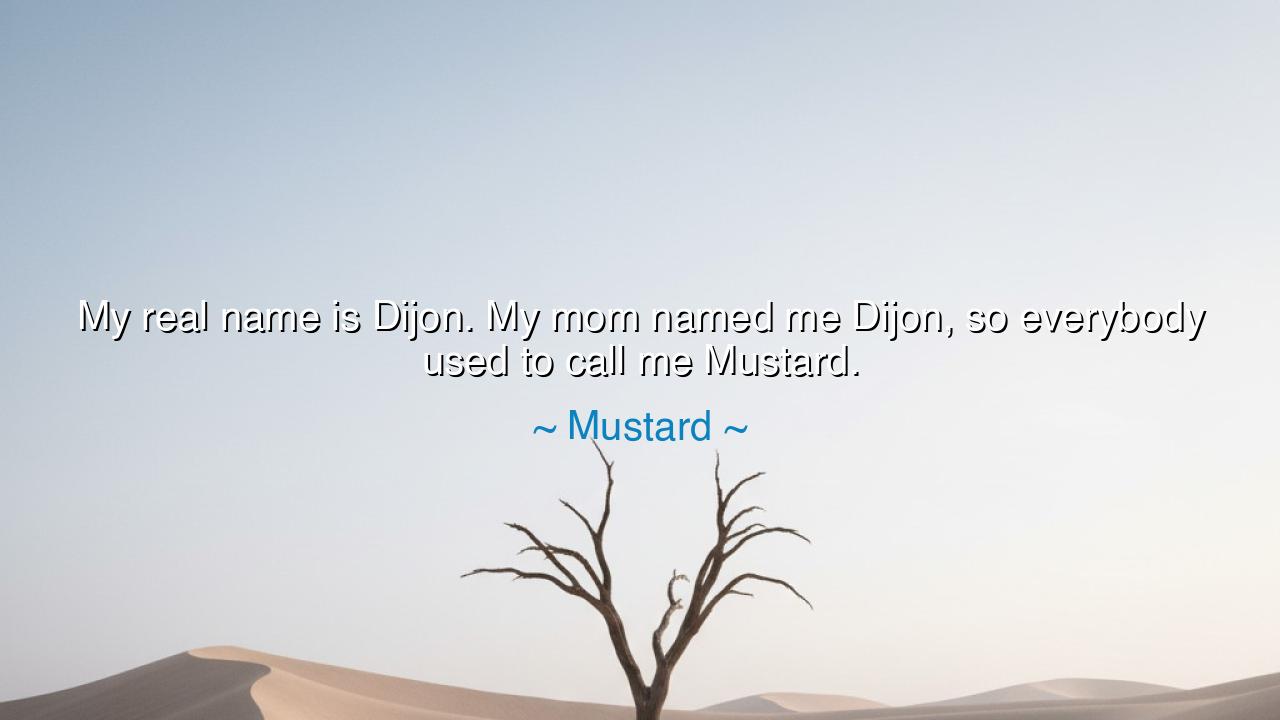
My real name is Dijon. My mom named me Dijon, so everybody used






When Mustard said, “My real name is Dijon. My mom named me Dijon, so everybody used to call me Mustard,” his words, though simple, carry the quiet poetry of identity, transformation, and destiny. Beneath the humor and casual tone lies an ancient truth — that what others call you, even in jest, can become the seed of what you are meant to become. In this single sentence, we find the story of how a name, born from chance and affection, can evolve into a symbol of power and self-definition. It is the tale of how something ordinary — a condiment, a nickname — can, through will and creativity, become a mark of greatness.
In the ancient world, names held sacred meaning. They were believed to shape fate. The Egyptians named their children after gods, hoping divine favor would follow them. The Hebrews gave names that foretold destiny — “David,” beloved; “Solomon,” peace. To name was to bless, to summon potential into being. So when Dijon McFarlane became “Mustard,” he was unconsciously stepping into this same tradition of transformation. The nickname given to him by others, a playful jest rooted in his mother’s choice, became his sigil of identity, the emblem he carried into the world of music and creation. What was once teasing became triumph — what began as laughter became legend.
There is a deep symbolism here. Dijon, the refined and flavorful city of France, known for its mustard, represents origin — the essence of who he was born to be. Mustard, the spice drawn from that name, represents the evolution — the outward expression of his talent and boldness. His very name is a parable: from something simple comes something sharp, vibrant, unforgettable. The ancients would say this is how destiny works — it begins as a whisper, unnoticed, until the soul recognizes its meaning and claims it with pride. He did not reject the name that was given in jest; he transformed it, proving that identity is not what others bestow, but what one makes sacred through purpose.
There are echoes of this same journey in history. Consider the story of Alexander the Great, whose tutor, Aristotle, once mocked his fiery ambition as youthful pride. Yet it was that very fire that carried him across continents, carving his name into eternity. Or think of Malcolm Little, who, in seeking freedom from the names imposed upon him by history, became Malcolm X — a letter signifying the unknown, the unclaimed, the power of self-definition. So too did Mustard take what others gave him and turn it into something unshakably his own. In doing so, he joined the eternal lineage of those who have turned ridicule into reverence.
His story also reminds us of the mysterious bond between mother and destiny. “My mom named me Dijon,” he says — and in that small act, his mother, knowingly or not, gave him the key to his future. It was her love, her voice, that set the first spark. In many traditions, the mother is seen as the first prophet in a child’s life, the one who speaks their destiny aloud before they can walk. By naming him Dijon, she planted within him the idea of flavor, individuality, and distinctness. Life — and his art — would later refine that essence, but the foundation was maternal wisdom. The nickname “Mustard” was merely the natural flowering of that original seed.
Yet, beyond all this symbolism, the quote reveals something deeper about acceptance and authenticity. Mustard did not resist the name given to him; he embraced it. He understood that one’s power often lies in reclaiming what the world offers, even if it comes in mockery or misunderstanding. Where others might have felt embarrassed or sought to escape the shadow of a playful name, he turned it into a crown. This is the alchemy of the artist — to turn laughter into rhythm, to turn simplicity into style, to make the world’s noise echo your own truth. It is the act of saying, “This is who I am — and I make it powerful.”
So let this story be a lesson for future generations: do not reject the strange, the humorous, or the humble beginnings of your identity. Every name, every label, every joke carries the potential for transformation. What others use to define you can become your greatest source of strength if you learn to own it, shape it, and make it sing with your purpose. The world will always name you; your task is to redefine what that name means.
In the end, Mustard’s journey stands as a modern myth — a reminder that destiny often hides in plain sight, waiting for us to recognize it. His name began as a quirk of fate, but he made it a symbol of creativity, resilience, and joy. Like the spice itself, he added flavor to the world. And through his story, he teaches us that what matters is not the name we are given, but the meaning we create from it — the fire we bring to it — and the legacy we leave behind.






AAdministratorAdministrator
Welcome, honored guests. Please leave a comment, we will respond soon